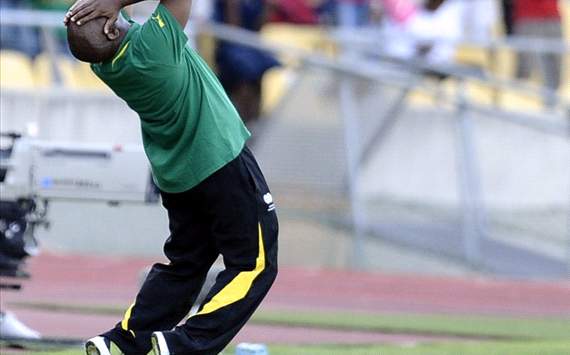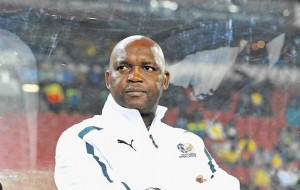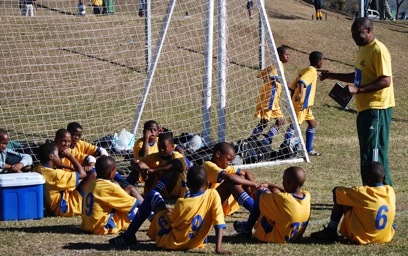
Guest post by Mohlomi Maubane
The Germans regularly find a way to excel in tournaments and are among the favourites to win the Euros in Poland/Ukraine. The South African football fraternity would do well to take a page out of the playbook that produced the current incarnation of Die Manschschaft when appointing a new Bafana Bafana coach. SAFA fired Pitso Mosimane this week after Bafana Bafana could only muster a 1-1 draw against Ethiopia in a 2014 World Cup qualifier in Rustenburg.
Eight years ago, the German national team was in dire straits after failing to win a single match in the group stages of the 2004 Euros. A rebirth seemed inevitable, and the newly appointed technical team of Jürgen Klinsmann and Joachim Löw pursued it with typical German precision.
Their first step was to give Die Manschschaft a new identity. The duo settled on a style based on playing the ball on the ground and transitioning swiftly from defence to attack. This was the outcome of an extensive consultation process. Workshops were held with German coaches and players to inquire how they wanted to play and how they wanted to be seen to be playing by their fans (and international ones too). Members of the German public also enjoyed the opportunity to provide input on how they wanted the national side to play.
From this inclusive process, Klinsmann and Löw drafted a curriculum for German football that was presented to the Bundesliga and the German FA. The latter then pressured teams in the former to build academy programmes that adhered to the overall strategy. Bundesliga teams were also encouraged to adopt a fitness programme that enabled the philosophy to be implemented. The newly appointed Under-21 coach also had to abide by the new policy.
Tag: Pitso Mosimane
Spotlight on African Coaches

Editor’s Note: This post begins a multi-part series on African coaches.
Continuing with Pitso is Regressing
Guest Post by Mohlomi Maubane
SOWETO, SOUTH AFRICA — In a recent issue of Kick Off, South Africa’s leading soccer magazine, Editor Richard Maguire argued against firing Bafana Bafana coach Pitso Mosimane (in photo above). Pitso, of course, is singularly responsible for South Africa’s embarrassing failure to qualify for the 2012 African Nations Cup finals (aka The Comedy in Nelspruit). I have been collecting Kickoff since high school. As a magazine, it expects vision, competence and innovation from every member of the South African football fraternity; hence the editorial vouching for Pitso to stay on as Bafana Bafana coach was surprising.
The crux of Maguire’s argument is that Mosimane should remain in charge for the sake of continuity. I say there should not have even been a beginning. Mosimane’s coaching success has been overblown. At club level, he led well-endowed Supersport United to five cup finals, losing three, and at national team level he was an assistant coach during a mediocre run from 2006 to 2010, when Bafana sunk to 90th in the FIFA World Rankings.
The ridiculous manner in which South Africa failed to qualify for the 2012 African Nations Cup finals showed Mosimane to be as unprofessional as his employers. How can a national coach fail to read or grasp competition rules? This is a man who thinks of himself as a “modern” coach always in step with the latest developments in the world game. Perhaps common sense is not part of the curriculum of the courses Mosimane often brags of attending. And for all his supposed keeping abreast with the latest trends in the game, Mosimane’s idea of “global football” is confined to the English Premier League and La Liga.
SAFA appointed Pitso Mosimane as Bafana Bafana coach soon after the 2010 World Cup. At the time, there was talk of the dawn of a new era in South African football. In truth, there was the usual lack of specific detail on how to make this new epoch come about. Instead, SAFA officials spoke at length about Vision 2014, Bafana Bafana’s campaign to qualify for the World Cup in Brazil. The seven other national teams under SAFA’s auspices were left unmentioned. Now, a year after the Vision 2014 was unveiled, we are a joke in the football world.
More than anyone else, it was Mosimane’s job to ensure Bafana qualified for 2012. He was entrusted with the troops and should have known the rules of engagement. When he was introduced as the new Bafana coach after the World Cup, Mosimane was his typical pompous self, saying he did not expect favors from anyone, he knew his mandate, and that he wanted to be judged by the results. Here are the Nations Cup results: 2 wins, 3 draws, and 1 loss, 4 goals scored, 2 against. Having failed to qualify, his story has now changed. In his first press conference after the Comedy in Nelspruit, Mosimane had the audacity to say he did not fail because South Africa finished top of their group! That Bafana actually failed to qualify was in the past; it was time to move on, he said.
Indeed it is time to move on, and perhaps it is best to do so with a coach who reads and understands the rule book; one whose trophies and coaching acumen supersede his chest-thumping bravado. Pitso Mosimane has been in the national structures for more than five years and South African football would not be served well by a continuation of his underachievement.
If Mosimane were a football journalist and wanted to write for Kick Off, I suspect Maguire would send him away with the disdain he probably feels when the magazine has to document yet another SAFA cock-up.

National football styles are intertwined with a country’s history and culture. Can Pitso Mosimane, Bafana Bafana’s new homegrown coach, develop a common ‘South African’ playing style? If the former SuperSport coach and Bafana assistant succeeds, he will have done better than his Brazilian, Romanian, English, Portuguese, and French predecessors.
‘South African football is a sort of United Nations,’ writes Izichwe Youth Football director Thabo Dladla in his ‘Talking Football’ column this week. ‘You have parts of the country like the Western Cape with their English influence, inland areas with diski [street style] influence, some German and Dutch influence in SAFA structures, [and more recently] Brazilian and Serbian influences.’
Clearly, Mosimane faces a daunting challenge in trying to craft a common style out of a melange of local and foreign influences. ‘South African football is more about ball retention and individual improvisation,’ Dladla notes. ‘We grow up playing in small spaces, on hard, bumpy surfaces. The small frame and short-to-medium height of the majority of our players make it logical to play mainly short passes on the ground.’
World champions Spain point the way forward for South Africa. It’s not a question of conveniently jumping on the winners’ bandwagon. Rather, Dladla notes that ‘Spanish football is based on technique, ball possession and nimble short-passing combination.’ That Spain’s 11 starters in the World Cup all play in La Liga further inspires many South Africans eager to raise the quality of the domestic Premier Soccer League.
Will South Africa’s performances improve under Mosimane? Will a new national style of play reflect the sharper sense of South Africanness left by the 2010 World Cup? Perhaps, but until that time local fans will keep on blowing vuvuzelas in the stadiums: ‘They are bored,’ says Dladla, ‘There is nothing to entertain them between the lines.’